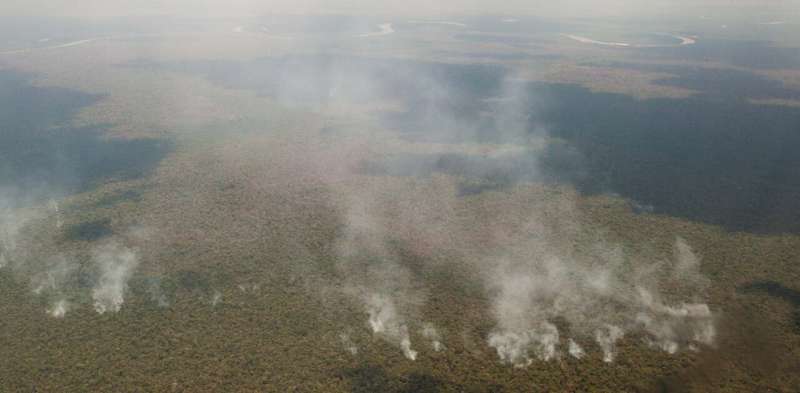The Amazon is on fire: Here are 5 things you need to know

Record fires are raging in Brazil's Amazon rainforest, with more than currently burning. They are collectively emitting huge amounts of carbon, with smoke plumes visible thousands of kilometers away.
Fires in Brazil increased by 85% in 2019, with more than half in the Amazon region, according to .
This sudden increase is likely down to land degradation: land clearing and farming reduces the , warms the soil and intensifies drought, combining to .
1. Why the Amazon is burning
The growing number of fires are the result of illegal forest clearing to create land for farming. Fires are set deliberately and spread easily in the dry season.
The desire for new land for cattle farming has been the in the Brazilian Amazon .
Ironically, farmers may not need to clear new land to graze cattle. Research has found a significant number of currently degraded and unproductive pastures that could offer .
New technical developments also offer the possibility of transforming extensive cattle ranches into more – offering the same results while consuming less natural resources.
2. Why the world should care
The devastating loss of biodiversity does not just affect Brazil. The loss of Amazonian vegetation across South America and other regions of the world.
The planet is losing an important carbon sink, and the fires are directly injecting carbon into the atmosphere. If we can't stop deforestation in the Amazon, and the associated fires, it raises real questions about our ability to reach the Paris Agreement to slow climate change.
The to stop illegal deforestation and restore 4.8 million hectares of degraded Amazonian land by 2030. If these goals are not carefully addressed now, it may not be possible to meaningfully mitigate climate change.
3. What role politics has played
Since 2014, the rate at which Brazil has lost . This is the result of economic crises and the dismantling of Brazilian environmental regulation and ministerial authority since the election of President Jair Bolsonaro in 2018.
Bolsonaro's political program includes controversial programs that critics claim will threaten both human rights and the environment. One of his first acts as president was to pass ministerial reforms that
Regulations and programs for conservation and traditional communities' rights have been threatened by economic lobbying.
Over the last months, Brazil's government has announced the reduction and extinction of environmental agencies and commissions, including the body responsible for .
4. How the world should react
Although Brazil's national and state governments are obviously on the front line of Amazon protection, international actors have a key role to play.
International debates and funding, alongside local interventions and responses, have reshaped the way land is used in the tropics. This means any government attempts to further dismantle climate and conservation policies in the Amazon may have significant diplomatic and economic consequences.
For example, trade between the European Union and South American trading blocs that include Brazil is increasingly infused with an environmental agenda. Any commercial barriers to Brazil's commodities will certainly attract attention: agribusiness is responsible for more than .
Brazil's continued inability to stop deforestation has also reduced international funding for conservation. Norway and Germany, by far the largest donors to the , have .
These international commitments and organizations are likely to exert considerable influence over Brazil to maintain existing commitments and agreements, including restoration targets.
5. There is a solution
Brazil has already developed a pioneering political framework to stop illegal deforestation in the Amazon. Deforestation peaked in 2004, but dramatically reduced following environmental governance, and supply change interventions aiming to .
Environmental laws were passed to develop a , with clearing rates in the Amazon falling by more than .
Moreover, private global agreements like the , where companies agree not to buy soy or cattle linked to illegal deforestation, have also significantly dropped clearing rates.
We have financial, diplomatic and political tools we know will work to stop the whole-sale clearing of the Amazon, and in turn halt these devastating fires. Now it is time to use them.
Provided by The Conversation
This article is republished from under a Creative Commons license. Read the .![]()




















